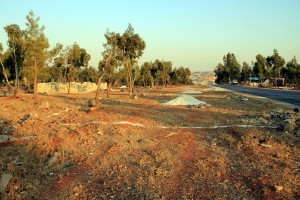Forests Threatened in Kfar Nabel

By Hazzaa al-Adnan
(Kfar Nabel, Syria) – “He who steals from a thief is as legitimate as he who inherits from his father,” said Abu Rashid, a 55- year-old farmer, after he cleared around 2000 square metres of Kfar Nabel mountain’s state-owned forestland and surrounded the area with stones. Over 50 of the residents of Kfar Nabel in the province of Idlib had done the same in other areas.

The armed opposition has controlled Kfar Nabel Since August 2012. Its residents have laid claim to most of the public forestland on both sides of the three kilometre road going from Kfar Nabel to the ruins of the ancient town of Shinshrah. The area contains a number of Roman and Byzantine-era ruins.
The forestation of Kfar Nabel began in the early 1980s as part of a United Nations-sponsored development plan for Syria’s public forests, and stopped with the beginning of the uprising in 2011.
Engineer Khaled al-Khatib, a public servant still employed by the Damascus government and head of the Kfar Nabel’s agricultural department, explains that his department is responsible for the forest land, and the law prohibits anyone from using the land. He says that residents have taken control of approximately 40 of the 700 hectares of forest land allocated to Kfar Nabel.
“In the past we used to stop the squatting violations with the presence of the police and security forces if need be. Now we cannot do that because of the absence of a security force capable of dealing with this issue and acting as a deterrent,” he said.
“Building without a permit is prohibited,” said a member of the government-allied municipality who refused to give his name. “But in the current circumstances we cannot do anything to protect government and municipality property, nor can we demolish any buildings.”
The recently established opposition-allied local council issued a decision directed at the Security Force of Kfar Nabel’s Shari’a court to remove the squatters. However, the Security Force did not execute the decision, according to Ahmad al-Mahrouq, one of the members of the council.
According to Captain Nasser al-Rahhal, the vice commander of the Security Force, their inability to carry out this decision, among others, is due to the lack of capacity and seriousness of the local council and military units in the city in supporting and assisting them.
“Most of those squatting illegally are armed and ready to use their weapons against those who want to remove them,” he said. “They see the Security Force as a random group of people rather than as an official security force.”
Lieutenant Colonel Fares al-Bayyoush, commander of the Knights of Righteousness Brigade, an armed opposition battalion which claims to be part of the Free Syrian Army, insists that his unit answered the Security Force’s call for assistance. He says that he sent a group of 15 fighters twice to help the security force in their duties, but that the latter cancelled the mission.
“The local council doesn’t care about this issue,” he said. He said that the Knights of Righteousness are ready to help with the removal of squatters whenever the need arises.
Ali al-Soueid, one of the members of the Security Force, believes that the reason the squatters have not been removed is that some members of the local council and armed military units are themselves committing construction violations in the area.
Mohammad Sheikh Khairo, the Imam of the Masjid Al-Kabir mosque in Kfar Nabel, says that Islamic law prohibits violations of state property, including the Kfar Nabel forestland.
Based on civil law and laws governing forest land, “no one can own forestland, even if he claims it for a hundred or more years,” said lawyer Abdallah al-Daif.
“Anyone who damages government forestland is required to pay the government compensation,” he said.
Article 19 of the legislative decree No. 25 of 2007 on the protection and management of forest investment states that “state forests are a national treasure that may not be claimed and whose land may not be scaled down in any way by anyone,” under penalty of prison or death, depending on the severity and consequence of the violation.
Abu Mahmoud, a builder in his thirties, says that he and his uncles have claimed around 10 dunams of the mountain. “Around 50 years ago, the government expropriated around 50 dunams of land from my grandfather at a very small price,” he explained.
A retired policeman in his sixties, Abu Majed says that he claimed around one dunam because he saw many others doing the same.
Abu Issam, one of the city’s notables who refused to disclose his position, lays the responsibility of what is happening with the “real revolutionary forces.” He believes that these forces must carry out an awareness campaign to make people understand that the revolution’s goal is to topple President Bashar al-Assad and not the state.
“The state and its laws were there before him and his father and will remain after them,” he said.
Abdel Aziz Moussa, a 67-year-old writer and retired philosophy teacher, calls for squatters on state property to be held accountable.
“We need to put those squatters to death without hesitation,” he said. He explains these violations through a lack of religion, bad upbringing, and a lack of conscience, and says that the long era of tyranny ruined society’s core and made people unconcerned with the public good.
